MOUNT OLIVE — When Glenn Holland took on the role of interim town manager for Mount Olive in January, he was immediately confronted with a significant challenge that has lingered for over a decade: the town’s wastewater treatment issues. The handling and discharge of sewage through the town’s wastewater treatment facility have been sources of concern for years, and Holland is determined to tackle this pressing problem head-on. Recently, he sat down with the Duplin Journal to shed light on the situation’s history and discuss potential solutions.
The treatment and discharge of wastewater in towns and cities like Mt. Olive are heavily regulated, with many guidelines established by the federal Environmental Protection Agency (EPA) and enforced by the North Carolina Department of Environmental Quality. This regulatory framework is designed to ensure that communities manage wastewater safely and effectively.
The nightmare for Mt. Olive came to a head when the town received a critical notice from DEQ’s Division of Water Resources. This notice indicated that Mt. Olive was not compliant with its operating permit for the wastewater treatment plant. The issues highlighted were serious: the town’s wastewater system was struggling to treat wastewater adequately, and the reclaimed water system was not functioning at its designed capacity.
The notice did not simply inform the town of the issue; it placed a sewer moratorium on the town, meaning no new sewer taps, extensions, or additional flow would be allowed through the wastewater treatment plant until the problems were resolved. No additional flow through the wastewater treatment facility means that the ability to issue new building permits for homes and businesses is becoming difficult to approve if it means more wastewater would have to be treated at the plant.
“We’re handicapped. We can’t do anything. We’re standing still,” Holland said, referring to the moratorium.
With this backdrop, Holland is focused on finding viable solutions to restore compliance.
The journey to relieve the town of the wastewater moratorium was addressed by the state in April of this year when the town entered into a Special Order of Consent with the Division of Environmental Quality. The seven-page document outlines a series of complicated steps the town must take before a removal of the moratorium would be considered. The document also included a fine for being in violation of discharge restrictions at a cost of $50,000. The order also contains a list of five potential violations if the town does not complete the required steps by specific dates. The penalties for the violations include $100 per day for failure to meet a scheduled date, and that is increased to $500 per day after seven days. Any reportable sewer overflow from the main trunk line or main pump station would result in a $5,000 penalty per event day.
Bringing the wastewater treatment system into compliance will not be a simple process and will likely cost the Town of Mt. Olive millions of dollars, according to Holland. The moratorium and the costs required to meet the state’s demands have placed the town in a “can’t win for losing” scenario. The order states the town “will not be permitted to accept any additional wastewater from any domestic, industrial or commercial sources without prior approval from the Washington (N.C.) Regional Supervisor and the Water Quality Permitting Section.”
Without the ability to add to the town’s tax base due to the restrictions on any additional wastewater, the question becomes how will the town afford the millions it will take to bring the system into compliance? That’s a question likely on the mind of the mayor and members of the board of commissioners.
Holland said one solution would be to change where the town discharges treated wastewater. Mt. Olive’s current discharge point is into a tributary of the Northeast Cape Fear River. The size of the river at that point restricts how much wastewater can be discharged there under EPA rules. If the town could pipe the treated wastewater to a larger body of water, such as the Neuse River, it could allow the town to add to its discharge capacity, which is currently restricted to one million gallons a day into the Northeast Cape Fear River.
The problem with that possible solution goes back to cost. Holland said it would cost millions of dollars to accomplish that feat. In fact, all currently considered scenarios have multi-million-dollar price tags associated with them. In the meantime, Holland continues to meet with engineers in hopes of creating a workable and affordable solution.
Town leaders are hoping the solution to the wastewater treatment woes will not force the town to place more demands on Mt. Olive citizens.
 Twitter
Twitter Facebook
Facebook Instagram
Instagram





